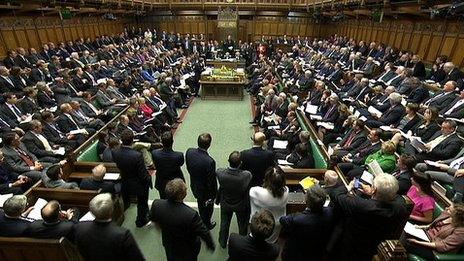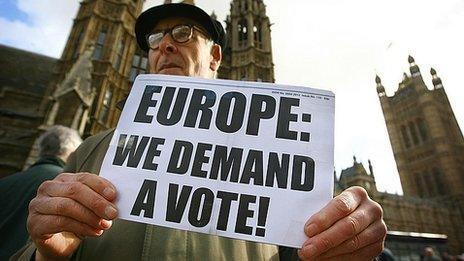James Landale: David Cameron and Conservative EU rebels
- Published
- comments
Unless something utterly unexpected knocks the stuffing out of the parliamentary timetable and a substantial minority of the Conservative parliamentary party have woken up to discover they have lost their vertebrae, David Cameron is poised to suffer the biggest rebellion of his premiership later.
The current holders of the record are the 41 Conservative MPs who chose just a week or two ago to vote against their government on a motion affecting the timetable of the Protection of Freedoms Bill.
The promised rebellion, according to the very excellent Philip Cowley of Nottingham University - the Bill Frindall of parliamentary rebellions - would not only be Mr Cameron's biggest revolt - if it tops that magic 41 - but it would also be the largest revolt ever by Conservative MPs in government over Europe. Period, as the Americans say.
The issue at hand in the House of Commons vote at 10pm may be a piece of so-called backbench business on a motion that is binding on no-one, but it matters.
It matters not because it would force anyone to hold a referendum on Britain's membership of the European Union. It would not. But it matters because of what it tells us of Mr Cameron's fractious relationship with his MPs and the potential consequences for the management of the coalition government.
Here are a few thoughts:
1. Why oh why has the government played hardball on this? Why didn't the government just roll over and allow its MPs to let off a little steam over a non-binding vote while Messrs Cameron, Hague and Osborne were overseas? To find the answer to this question that has so vexed Tory MPs over the weekend, ministers urge you to look carefully at the wording of the motion. It reads thus: "That this House calls upon the Government to introduce a Bill in the next session of Parliament to provide for the holding of a national referendum on whether the UK should a) remain a member of the European Union on the current terms; b) leave the European Union; c) re-negotiate the terms of its relationship in order to create a new relationship based on trade and cooperation."
There are two big no-nos in there. One is that it directly instructs the government to introduce a bill in the next parliament. This, say ministers, would be unacceptable to any government. Parliament does not tell governments what bills to introduce and when. If the motion had been less instructional and less specific, it would have caused less concern in Downing Street. Ministers note that the division earlier this year urging the government to oppose giving prisoners the vote was an expression of opinion, not an instruction to action, and thus ministers were able to roll with the punch. The second problem is more straightforward. It is not government policy to leave the EU. Downing Street insiders note dryly that the only large party to campaign on withdrawal from the EU were Labour in 1983. Any referendum that included the option of leaving the EU could never have been accepted by Downing Street. And whatever the rebels say about this being a non-binding motion, if it were passed, they would quite legitimately bang on about an in/out referendum being the will of the Commons until the cows were tucked up in bed and dreaming of clover.
There is also, say others, the small matter of Mr Cameron wishing to avoid: a) headlines using the word "u-turn", b) accusations that he can be pushed around by a section of his party and c) comparisons with John Major's push-me-pull-you relationship with his party's eurosceptics.
2. Why has the government appeared to be in such a muddle over this, changing the day of the vote and winding up so many of its backbenchers? Some ministers are prepared to admit privately that the government could have handled this better. They were not clear from day one that this was a three line whip issue, something on which the government could not move. They allowed the rebels to believe that there was flexibility when there was not. They hinted that this was a second order issue by fielding junior ministers in the media and scheduling junior ministers for the debate. Tory MPs could not understand why the government would chose to use a three line whip against a measure that arose from two mechanisms - the backbench business committee and the use of petitions - that the coalition itself championed.
3. This is a fight that both sides knew was going to happen one day. There is a strong eurosceptic sentiment in the current House of Commons. Thus far it has been diffuse, its focus spread across a range of issues from repatriating powers, to membership referendums, to the proceedings of the European Court of Human Rights. This vote crystallises all that sentiment and provides an outlet, uniting for the first time the eurosceptics of yore like Bill Cash and John Redwood with the new intake of Conservative MPs elected last year. Ministers knew there would be a clash one day and this is it. Their greater fear is if there were to be a vote on a substantive motion, such as whether or not Britain should fund another European bail out, or support a financial transaction tax so beloved of the European Commission. The reason ministers fear such votes is because they know they could not win them.
4. This is not just about Europe. This is also about party management. Many Conservative backbenchers are unhappy about a range of issues and are therefore less ready to listen to their whips and more ready to allow instinct to outweigh loyalty. In no particular order, some Tory MPs are upset about: the existence of the coalition and their perception that too many concessions have been made to the Liberal Democrats; the boundary changes that are making them nervous and keener to appeal to their eurosceptic party memberships; the cull of MPs itself; the lack of attention that they feel David Cameron has been paying them; the failure of the government to hold a referendum on the Lisbon Treaty; the recent appointment to government of women elected in 2010 over the heads of the 2005 intake; the growing awareness of many Tory MPs that they might never be ministers and are liberated as a result. The eurozone crisis has also put the wind in the sails of many eurosceptic MPs who feel vindicated after being marginalised for years.
5. So what happens now? The crucial moment could come not in the debate itself but during the statement that precedes it. Mr Cameron is due to be on his feet for an hour or so from 3.30pm informing the House about the European summit on Sunday. But his bigger task will be to answer questions about why a referendum on Britain's EU membership is not right now. The obvious point he will make is that this is a distraction when the eurozone is in such crisis. He will also go further and make it clear that Britain has to prepare for huge change within the EU in the very short term. There could be substantial treaty changes within the next few years. Three "Europes" could emerge: an inner core of the eurozone bound together by greater fiscal union, an outer core of northern euro countries who are cautious about more integration, and the ten EU members outside the eurozone. The prime minister will argue - as he did on Sunday- that Britain should use this transformation to protect and advance Britain's national interests by repatriating certain powers from Brussels to London.
But, I am told, he may also suggest that such treaty change could prompt a referendum anyway if all 27 member states were affected and it transferred powers from London to Brussels, particularly over the single market. This is existing government policy. So watch closely to see if the prime minister hints at a possible referendum and if so, how hard he pushes the idea. His point would be: there is no need to push for an in/out referendum now because you are going to get a referendum sooner than you think anyway.
6. What will the rebellion mean for the future? The number of MPs who have tasted rebellion for the first time will have grown and it is often a taste they can learn to live with. It will be a rebellion that will set the tone for future debates and votes about Europe that could come to dominate the latter half of this parliament if the eurozone crisis forces institutional change. It will send a signal to voters that while many of David Cameron's MPs respect him, they don't always feel loyalty towards him, and that is something that voters tend to note and inwardly digest. It will allow Labour to compare Mr Cameron with John Major and claim the Tories are divided over Europe. But above all, the rebellion will cost Mr Cameron political capital that perhaps he may have preferred to spend in tougher times in the years ahead. There will be bigger votes and more important votes and from today he will find it harder to get the numbers he wants.
- Published25 October 2011

- Published21 May 2015

- Published24 October 2011
- Published20 October 2011
- Published18 October 2011